The Lowdown
Overall, I’m far more enamored of Lumen than I expected to be; the science is accurate, the device is well-built, and it works well as a guide. I don’t feel like the app results are judging me or pushing me towards a prefabricated plan, and I really like the idea of working my day around flexible macros depending on the Lumen outcome. It’s hard to say what the results will be long-term, but if I can stick with Lumen and see a significant difference, I’ll create a follow-up!
Overall
Pros
- Easy to navigate the app
- Lumen hardware quality is excellent
- The carrying case is a nice touch
- Lumen gives insights into metabolic health that you can’t usually access
- It forces me to be more mindful of my snacking and eating
- The app provides tips and tools to maximize metabolic health
Cons
- It would be great if Lumen used a regular USB-C to charge in place of proprietary contacts
- I sometimes have to breathe multiple times to get a useful reading
There are many ways to track your overall health, but most focus heavily on physical markers like heart rate; this is helpful, for sure, but that doesn’t always tell you how your body is doing when you’re not actively working out. You can track what you eat and guess pretty well, but being able to quantify whether you’re burning fat or carbs and how your body responds to workouts can make a huge difference — enter Lumen, which aims to “hack your metabolism” to maximize your health.
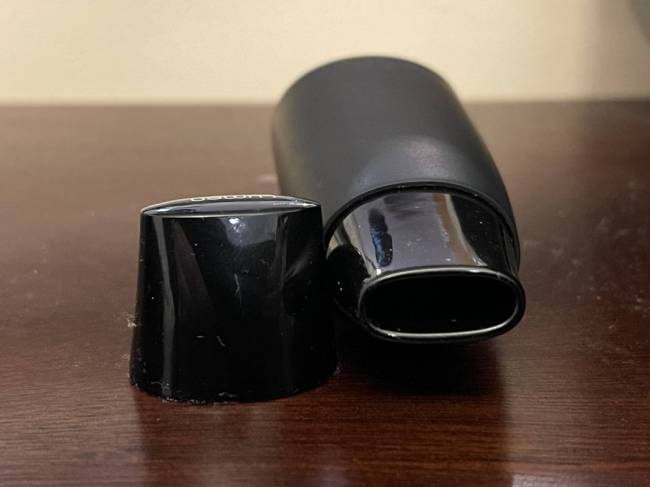
Lumen has a device that measures your metabolism via breathing into it; it then interfaces with a companion app that lets you know if you’re burning fat, carbs, or a combination of both.
The idea here is that you want to be using carbs before a workout where high-energy food might be helpful, but you want to be burning fat in the morning since that helps with weight loss. The Lumen app provides you with a snapshot of the macros you want to be hitting in terms of fat, protein, and carbs, based on the reading it gets from your breath.
We’ll get to the mechanics of using Lumen in a moment, but first, let’s talk about the science behind it.
I was a bit skeptical at first but had the opportunity to speak with the company and learn more about how and why Lumen works. When you’re breathing into it, it measures the CO2 in your breath. High CO2 means carb burn, while a low CO2 count indicates you are in a fat-burning mode; this is a legitimate way to measure carb counts.
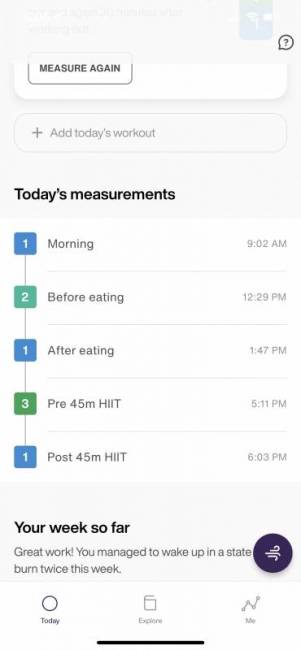
It’s been far more years than I will admit since I took any sort of biology class, so bear with me. From what I’ve read in this NIH study, it appears that you can determine if your body is burning carbohydrates using a ratio of CO2 to oxygen-the more CO2, the more your body is breaking down carbs and releasing CO2 as a byproduct.
The study isn’t specific to Lumen, but it looks at the general health and nutrition guidelines that can be helped from understanding this ratio. It’s a bit heavy on the science, but it’s worth a read if you’re curious about the background of using CO2 as a metabolic measure.
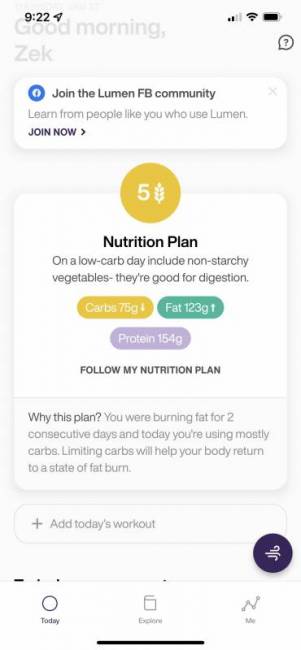
Ok, so the science here is sound. But why is it necessary or helpful? It’s one thing to know that you need to balance fat, protein, and carbs, and it’s another to figure out how that looks on a daily basis. Some people can eat intuitively, but it’s not that simple for many of us.
Lumen is helpful because it sees those macro breakdowns as dynamic, not static, and it will update and change them based on your breath measurements and what you tell it about your plans for the day.
The more I measure, the more Lumen learns about my body, and the more personalized and specific the macro plan can become. For example, I told the app I planned to do a 45-minute high-intensity interval workout. So the daily “nutrition plan” suggested a slight uptick in carbs to fuel my workout appropriately.
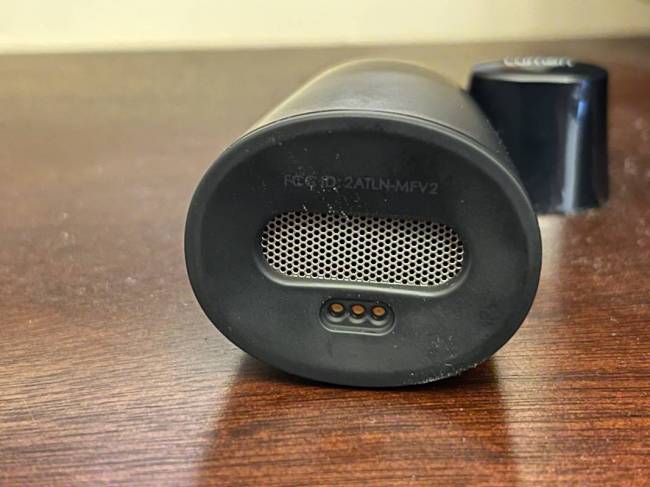
What I really love about Lumen is that by measuring your CO2, it’s taking into account your actual metabolism instead of guesstimating based on cardio health.
One thing that I often discuss with my personal trainer is that when I review any sort of athletic watches, they often struggle with where to rank my day in terms of fitness when it comes to weightlifting and muscle-building.
They’re limited to measuring your heart rate and steps most of the time, which means that a day where I did an intense, painful lifting workout might not register or be measured as intensely as if I went for a long walk/run/bike ride.
It’s the nature of the beast since it’s far easier to measure cardio effort-your heart is beating faster, you’re working harder.
Short of slapping electrodes directly onto my body, it’s hard to determine objectively how “hard” a lifting workout was because that can’t be easily captured by heart rate or even length of time. I might do 3×10 overhead presses that aren’t challenging for me, but they would require immense effort from someone else of the same height/weight; therefore, the caloric burn and overall metabolic impact will differ.
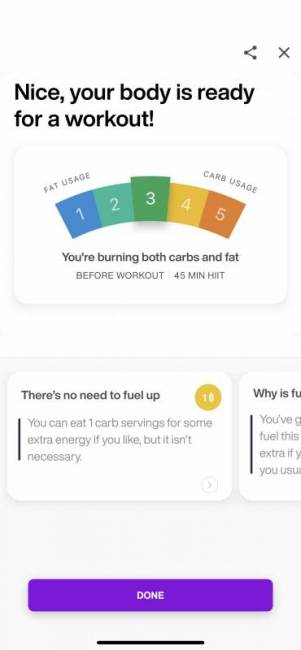
Lumen solves that to a significant extent-by measuring metabolic response before and after a workout; it captures the intensity more accurately.
For example, before a workout, Lumen determined I was burning carbs and fat, and therefore I didn’t necessarily need to fuel up. When I blew into the Lumen 30 minutes post-workout, it determined I had used up my carb reserves, and it recommended eating a bit heavier on carbs to replenish and recover.
It also means Lumen will suggest new macro goals for you each day.
A few days ago, Lumen suggested around 150g of carbs for the day, but this morning I blew into it, and it determined I was still burning carbs (which makes sense; I had rice with dinner last night, so it was more carb-heavy than usual). As a result, today’s suggestion ups the fat and protein side of my macros and lowers the carb count.
I really enjoy the dynamic aspect of adjusting how I eat to how my body is metabolizing the food, rather than blindly moving forward daily with the same average and hoping it evens out.
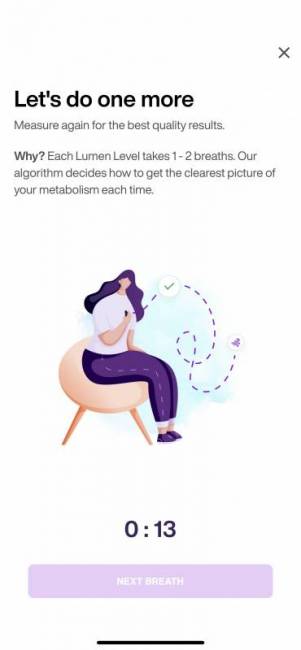
All this is fantastic, but it does mean committing to the Lumen. I use it every morning, and then before/after I eat and before/after workouts. I will admit that there are times when I miss a measurement or two, but I am trying to be consistent with my usage.
I like that using Lumen adds some mindfulness to my day; it forces me to stop and consider what I’m doing. I have to ask myself, “Do I actually want a snack, or am I just thirsty and/or bored?”
As weird as it sounds, just knowing I should blow into the Lumen before eating gives me that few seconds of self-reflection to decide, “Nah, I don’t really need that handful of pretzels, let me drink another glass of water and see how I feel in 30 minutes.”
Almost every time, I forget that I wanted a snack or realize that I was thirsty and not hungry. This is more of an ancillary benefit to the Lumen, but I think it helps because that forced check-in before eating adds a step that makes me evaluate my actions and helps keep me from munching mindlessly.
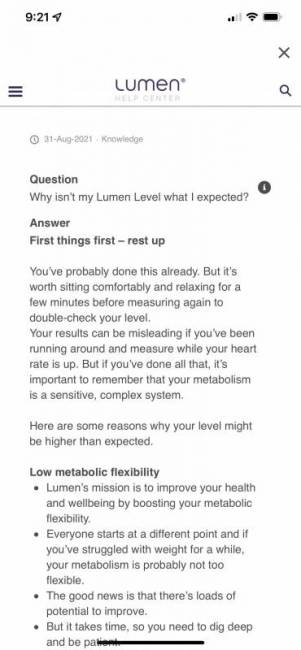
It also helps reinforce the benefits of intermittent fasting for me. I know that I tend to feel better, have more productive workouts, and lose weight slightly faster if I try to stick to a 16-8 plan where I only eat in an 8-hour window.
But the Lumen has helped quantify that for me, in that I’ve noticed if I keep myself to that window, I more consistently measure in a “fat burning” zone. It’s too early to tell if this will make a dramatic difference, but it adds some scientific credibility to my vague “I feel better when I do this” approach.
Lumen also has a database with tips and information if you’re surprised by the results or struggling to interpret them, which is helpful as well.
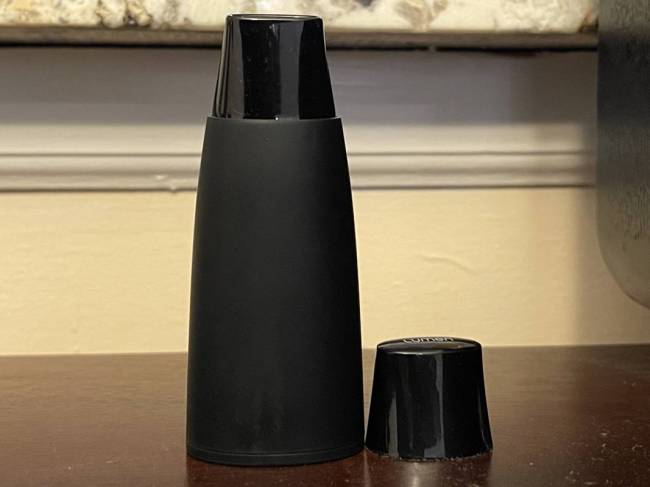
The hardware behind Lumen is solid. The device itself has only one button for on/off, and there’s a magnetic cap to cover the mouthpiece when it’s not in use. It also comes with a small cloth carrying bag and a dock that plugs in via USB-C to charge it.
I would love it if you could charge Lumen directly via USB-C since that would make it easier than having a dock to track, but I can see where using charging contacts keeps the device more streamlined.
Lumen is only 4″ long and about 1″ at its thickest point, so it’s fairly easy to toss it in a bag or a jacket pocket. The battery life is also excellent; when it isn’t in use, there appears to be little to no battery drain, and I’ve only charged it once since set up about a month ago, and it’s still at 60%.

My only issue with Lumen is breathing into it to get a reading. You take a big deep breath with it, hold it for 10 seconds, and then breathe out into the Lumen again. The breathing out part takes some technique because you have to pace it, so Lumen picks up the reading; too fast and it won’t pick it up, too slow, and you run out of breath before it’s finished.
The app gives you a few tries to get it right, and if you’re really struggling, it has you pause for 5 minutes to relax, breathe normally, and try again. I’ve found that the trick is to make sure that when I inhale, I’m really expanding my lungs fully; it means I have enough stored air to breathe out long enough for the Lumen to register my breath correctly.
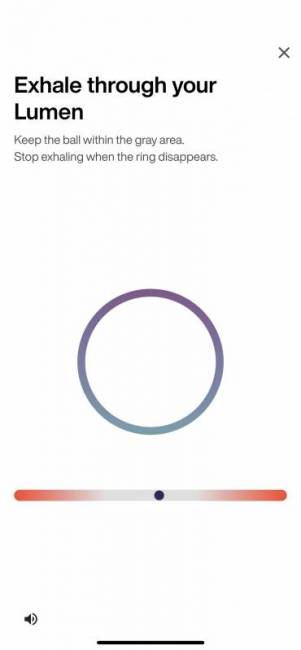
Overall, I’m far more enamored of Lumen than I expected to be; the science is accurate, the device is well-built, and it works well as a guide.
I don’t feel like the app results are judging me or pushing me towards a prefabricated plan, and I really like the idea of working my day around flexible macros depending on the Lumen outcome. It’s hard to say what the results will be long-term, but if I can stick with Lumen and see a significant difference, I’ll create a follow-up!
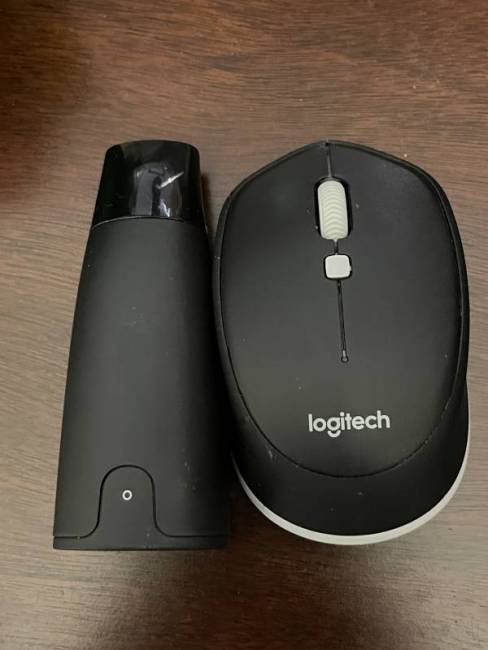
For size reference, here is Lumen next to my mouse.
If you’re intrigued by Lumen and want to see how it does for you, you can use promo code GEARDIARY to get 10% off, and their current sale will allow you to take an additional 10% off as well (running through January 31st). Lumen’s pricing includes both the hardware and the associated software since the real meat of the whole package is interpreting the data.
There are three ways to purchase Lumen: “Metabolism booster” is a six-month track that costs $249 followed by $25/month, “Advanced Fat Burn” is a 12-month track that costs $399 (it’s currently on sale for $269 and renews annually), and “Optimal Health” is an 18-month track that costs $449 (it’s currently on sale for $349, renewing every 18 months); all plans can be canceled at any time. Lumen is available directly from the manufacturer.
At full price, these work out to just shy of $25/month, which isn’t an insane cost for a fitness and health tool. We’ve all paid far more for gym memberships we didn’t use!
Source: Manufacturer supplied review sample
What I Like: Easy to navigate the app; Lumen hardware quality is excellent; The carrying case is a nice touch; Lumen gives insights into metabolic health that you can’t usually access; It forces me to be more mindful of my snacking and eating; The app provides tips and tools to maximize metabolic health
What Needs Improvement: It would be great if Lumen used a regular USB-C to charge in place of proprietary contacts; I sometimes have to breathe multiple times to get a useful reading

Wow, a device that can boost your metabolism. That is a machine I need! I use to be extremely active, always on the go. Then I suffered a spinal cord injury and it ended. I can’t walk anymore and have severe nerve damage. So being active is not possible anymore. So if there’s a machine that can/will boost my metabolism. For my physical and mental well-being, I’d need it
How do I get the link to my comment?
thanks for sharing!
I need this!
This is so interesting. I’ve often wanted to be able to understand my metabolism because too often I’ve treated it as the same as just cardio health. So cool!
This seems interesting, but not sure it would be helpful or effective with anyone who has a disability or chronic illness, which is a massive part of the population.
I’ve found that my two biggest obstacles to using these types of devices are commitment and consistency. It’s an interesting approach, and yours an informative review.
This is great. Still a little pricey for me right now, though. Something that could be very useful.